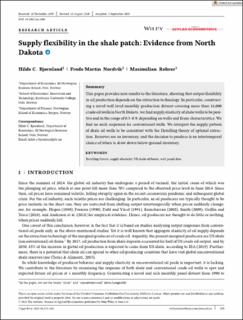| dc.contributor.author | Bjørnland, Hilde C. | |
| dc.contributor.author | Nordvik, Frode Martin | |
| dc.contributor.author | Rohrer, Maximilian | |
| dc.date.accessioned | 2021-09-14T13:20:30Z | |
| dc.date.available | 2021-09-14T13:20:30Z | |
| dc.date.created | 2021-04-22T15:38:59Z | |
| dc.date.issued | 2021 | |
| dc.identifier.citation | Journal of applied econometrics. 2021, 36 (3), 273-292. | en_US |
| dc.identifier.issn | 0883-7252 | |
| dc.identifier.uri | https://hdl.handle.net/11250/2776516 | |
| dc.description.abstract | This paper provides new results to the literature, showing that output flexibility in oil production depends on the extraction technology. In particular, constructing a novel well-level monthly production dataset covering more than 16,000 crude oil wells in North Dakota, we find supply elasticity of shale wells to be positive and in the range of 0.3–0.9, depending on wells and firms characteristics. We find no such responses for conventional wells. We interpret the supply pattern of shale oil wells to be consistent with the Hotelling theory of optimal extraction. Reserves are an inventory, and the decision to produce is an intertemporal choice of when to draw down below-ground inventory. | en_US |
| dc.language.iso | eng | en_US |
| dc.publisher | Wiley | en_US |
| dc.rights | Attribution-NonCommercial-NoDerivatives 4.0 Internasjonal | * |
| dc.rights.uri | http://creativecommons.org/licenses/by-nc-nd/4.0/deed.no | * |
| dc.title | Supply flexibility in the shale patch: Evidence from North Dakota | en_US |
| dc.type | Journal article | en_US |
| dc.type | Peer reviewed | en_US |
| dc.description.version | publishedVersion | en_US |
| dc.source.pagenumber | 273-292 | en_US |
| dc.source.volume | 36 | en_US |
| dc.source.journal | Journal of applied econometrics | en_US |
| dc.source.issue | 3 | en_US |
| dc.identifier.doi | 10.1002/jae.2808 | |
| dc.identifier.cristin | 1905899 | |
| cristin.ispublished | true | |
| cristin.fulltext | original | |
| cristin.qualitycode | 2 | |

